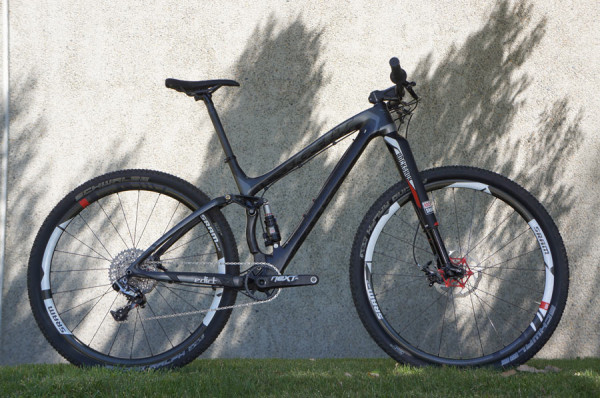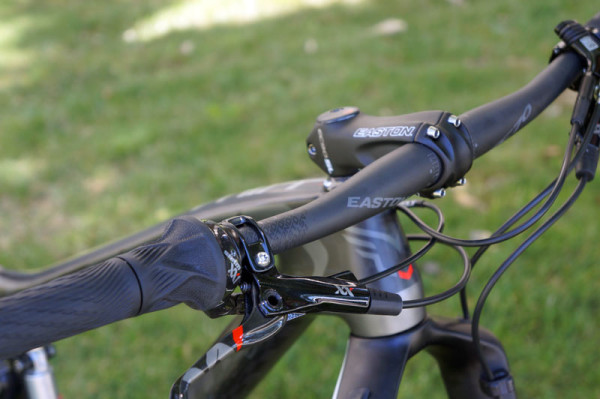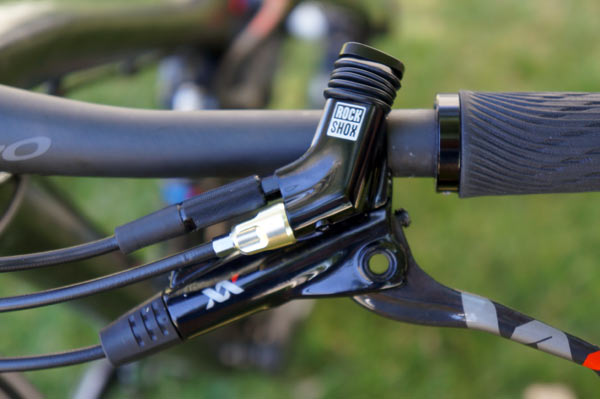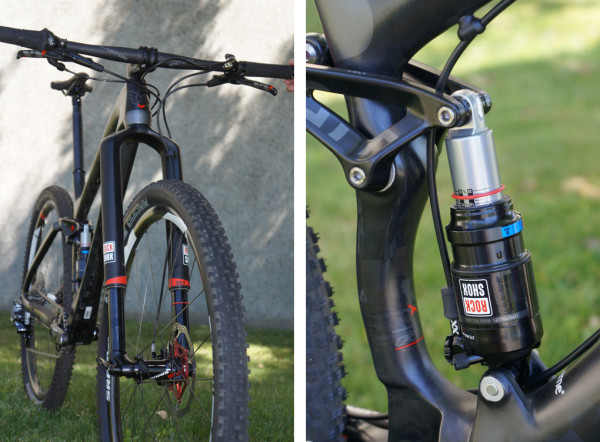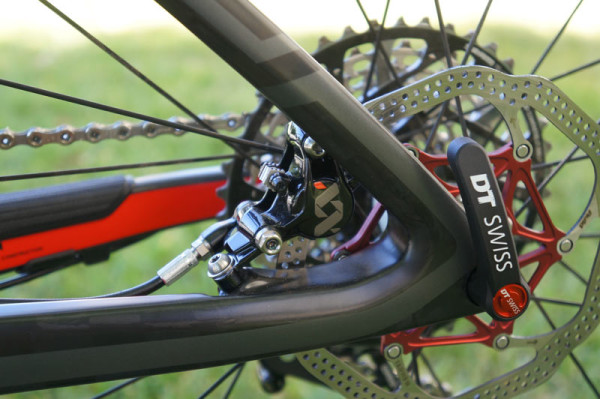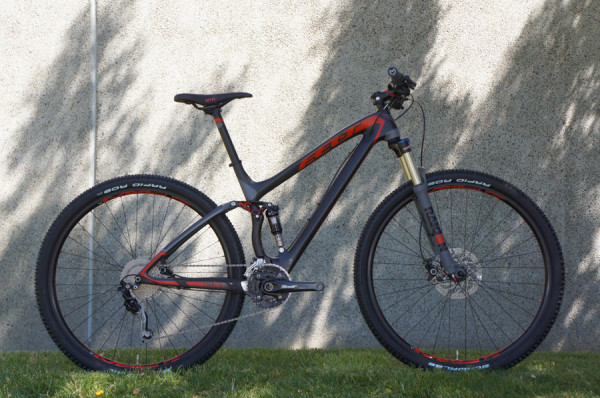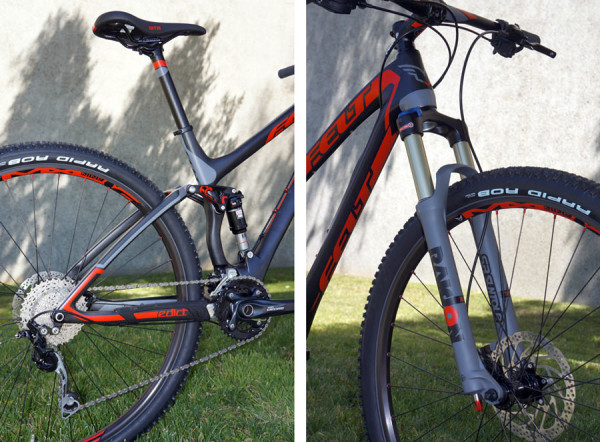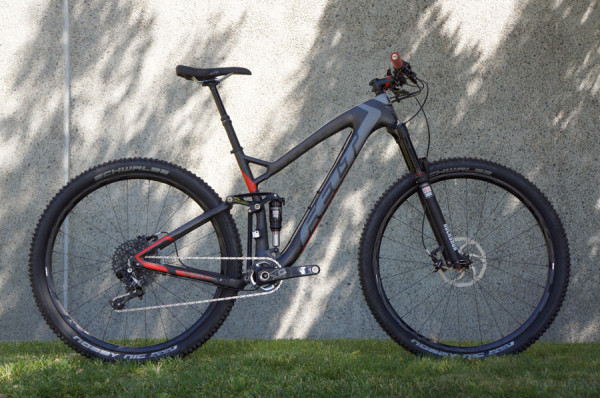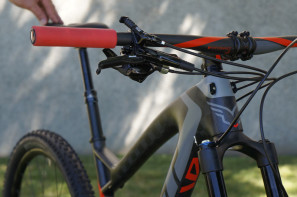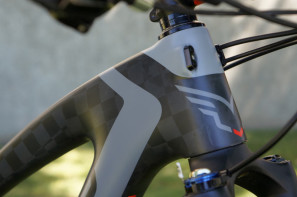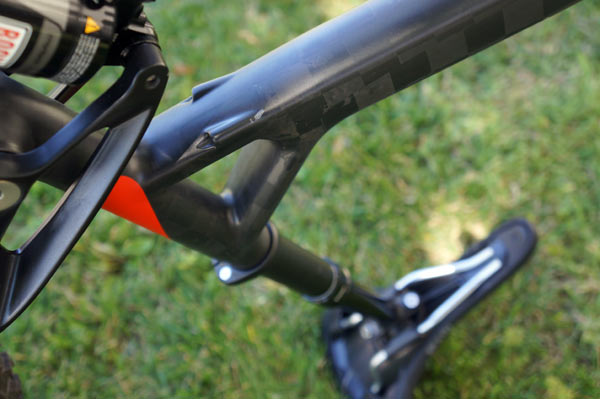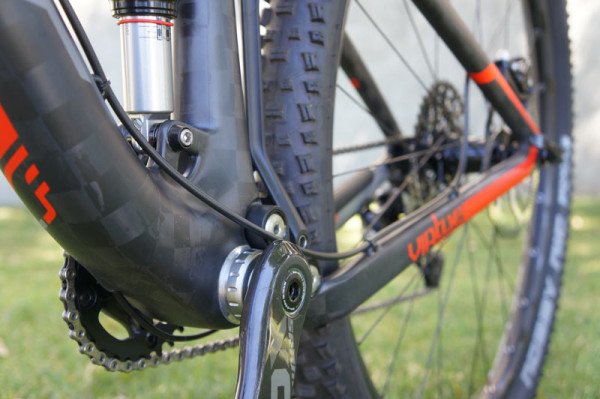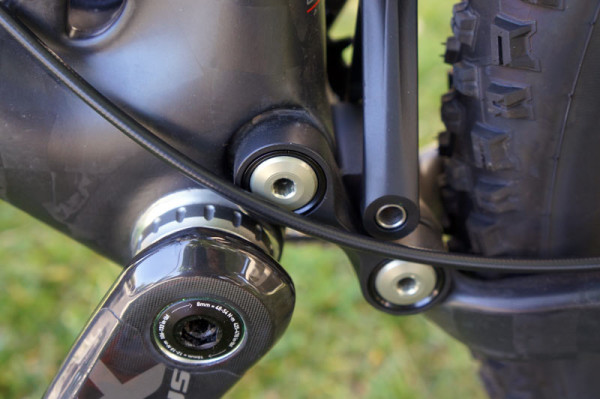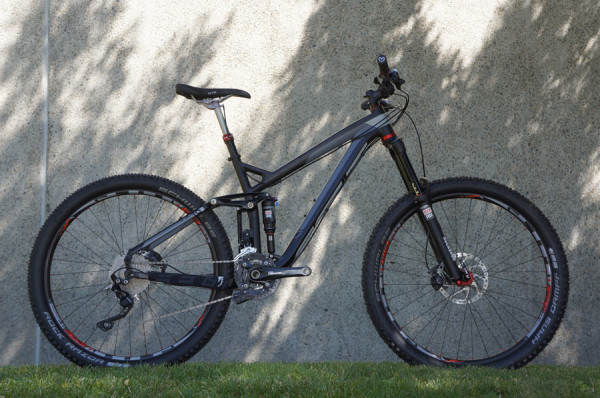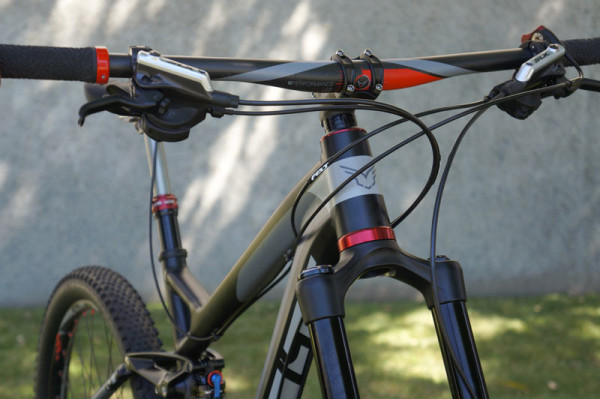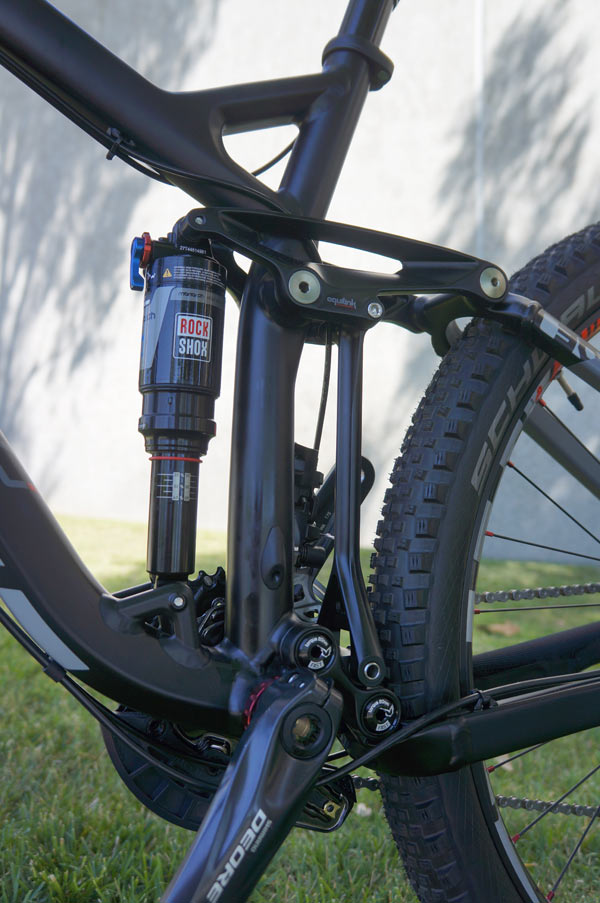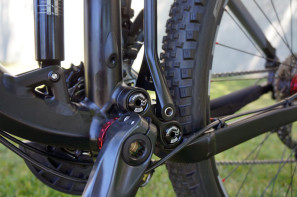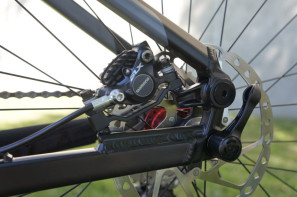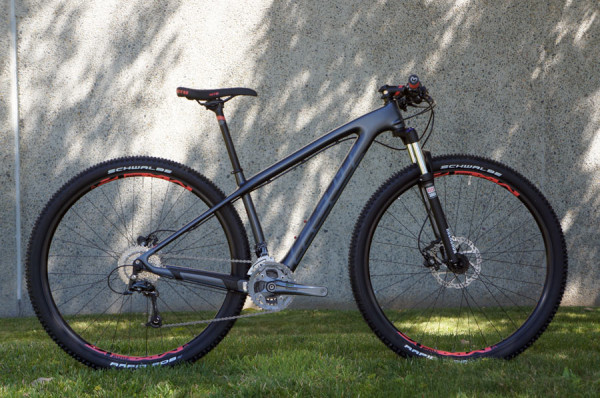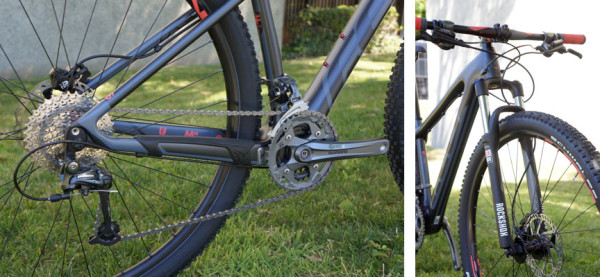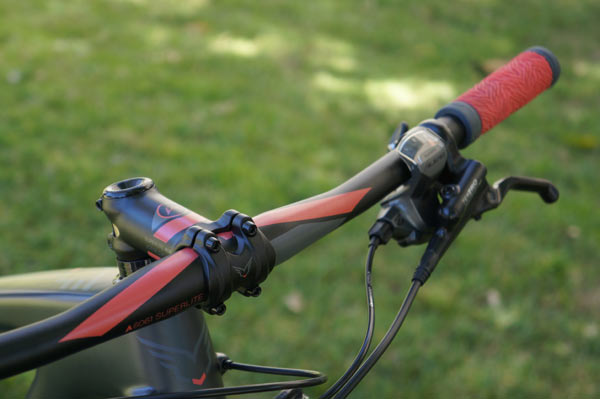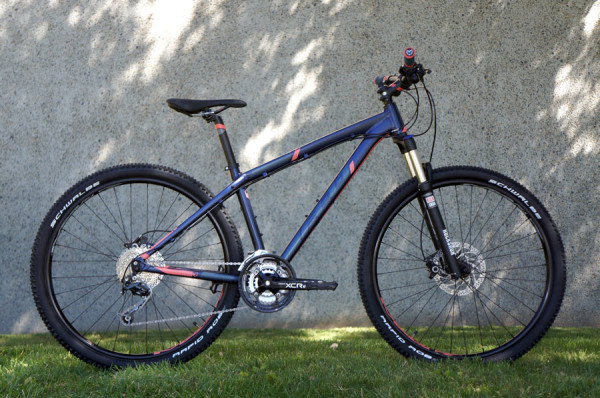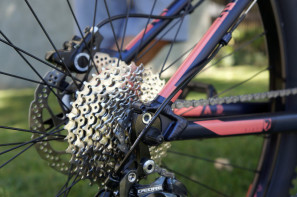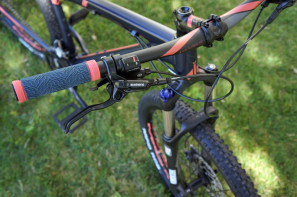For 2015, Felt’s mountain bikes don’t introduce any brand new models, but like the road side they bring their top level tech down to more affordable level while also spreading their TeXtreme carbon to more bikes. They’ve also added a few women’s specific hardtails, from a carbon 29er racer to alloy 27.5 entry level builds. At the very top end, there’s a new FRD Edict that’s built with top shelf components to be a lightweight, World Cup level full suspension XC race rocket. We’ll start with that.
The new Edict FRD takes advantage of their top level UHC carbon and adds TeXtreme with a build that’s an XC racer’s dream with an XX1 Grip Shift group turned by a Race Face NEXT SL crankset, RS-1 fork with Monarch XX using their X-Loc Full Spring dual-push lockout to control both. An Easton carbon fiber cockpit, including the EC90 stem, and Avid XX World Cup brakes with 180/160 rotors. The Edict is a 100mm travel bike, but for this model they set the RS-1 at 120mm travel to make the bike a bit more aggressive. It’s rolling on the Rise 60 carbon wheels with Schwalbe Nobby Nics tires.
With some top-tier full suspension XC race bikes easily topping $10K these days, the Edict FRD’s $8,999 price tag seems almost reasonable considering the spec.
The Full Spring dual hydraulic lockout controls both fork and shock, though it did require an unusual shock mount:
The shock is mounted upside down to accommodate the lockout hose’s angle of entry. Production models should have the Rockshox logo decal applied so that it’s right side up.
XX brakes save a few additional grams over the new Guides, and with 180mm rotors up front and 160mm in the back should provide more than enough power for XC and light trail riding.
Below the FRD, the Edict 1 also gains TeXtreme carbon mixed with their third tier UHC Performance to drop a bit of weight. Spec is Rockshox 100mm SID RL and Monarch RT, XO1 and XO disc brakes for $5,499. The Edict 3 loses the TeXtreme, switches to a Reba RL fork and Deore/XT mix for $3,199.
The carbon line drops all the way down to the Edict 5 (shown) with a full Deore build and Suntour Raidon fork for $2,599.
The idea here was to offer high school league racers a top level frame that’s worth upgrading with parts spec that’ll keep them rolling until they can upgrade parts here and there. There’s also the Edict 60, their lone alloy version, for $1,799 with the same fork and basic build with the exception of using a triple crankset rather than 2×10.
The Edict line uses their Fast suspension platform, which is a pivot-free rear triangle that uses flex in the seat stays to allow for a lighter, stiffer rear end. At the top of the travel, the flex is helping to unweight the suspension, creating anti-pedal bob. Weighting the bike with rider sag puts it into a neutral position, which they say allows for a very supple yet efficient short travel suspension that doesn’t need as much (or any) platform built into the shock. For longer travel bikes, they use their Equilink design that connects the upper and lower linkages to control the curve and axle path.
The Virtue is their 130mm travel 29er all-mountain trail bike, and it gets a couple new models at the top of the range. For the money-is-no-object crowd, the new Virtue FRD that uses the TeXtreme material to drop significant weight while getting stiffer, too. How much weight? Keep reading…
The frame is a blend of their top level UHC Ultimate carbon with the TeXtreme woven added for strength and impact resistance. It’s available as a complete bike with 140mm Rockshox Pike RCT3, Monarch shock and Reverb Stealth, Shimano XTR group and Easton Haven Carbon wheels wrapped in Schwalbe Nobby Nic tires. Up front there’s an Easton EC90 carbon stem with Felt carbon handlebar. Complete bike is $9,499, also available as a frameset for $4,499.
They tweaked the cable/hose routing so it’ll work with Shimano’s new XTR Di2 group and dropper seatposts, providing two exit ports under the top tube – one for front derailleurs, the other for externally routed dropper posts.
Mechanics will be happy to note that their Equilink bikes use a standard threaded bottom bracket. Besides being Felt’s preference for it’s proven simplicity, they need it to work with their suspension design:
The pivots sit very, very close to the BB, so there’s no room for a larger diameter bearing or opening.
Just below the FRD model is the Virtue 1, which drops down to their UHC Advanced carbon but still gets TeXtreme blended in to drop a full pound off the 2014 Virtue 1. offering a still very light frame that’s a bit more affordable at $5,999. Spec is 140mm Rockshox Revelation RLT, SRAM XO1 group with SRAM Guide brakes, Easton Haven Alloy wheels and Reverb Stealth. You can also get this version as a frameset for $3,499. What’s even more impressive about the frame weight improvement is that the FRD sheds another 100g off this!
Continuing on is a Virtue 3 with their UHC Performance carbon frame, Rockshox Sektor Gold fork, an XT/Deore mix and WTB Speed Disc i23 wheels for $3,499. Two alloy models with double butted 6061 metal carry over, with the Virtue 50 getting the same build as the Virtue 3 for $2,399 and the Virtue 60 using a Suntour Aion LO-R fork, Deore group and basic alloy wheels for $1,999.
Moving up in travel and down in wheel size is the new Compulsion, a 160mm travel bike using the same Equilink suspension design as the Virtue. It’s a 27.5” (650B) platform that was formally introduced at Sea Otter and now gets official as a three-model line. They’re all using a 6061 double butted alloy frame with a standard 73mm threaded BB and tapered head tube. The top level Compulsion 10 (blue, shown at Sea Otter) gets a Rockshox Pike RC fork and Monarch RC3, Race Face Turbine crankset and SRAM XO1 group, Guide brakes and KS LEV dropper post. WTB KOM rims on Novatec hubs with Schwalbe Hans Dampf tires round things out. Retail is $4,499.
Below it, the Compulsion 30 (shown here) keeps the Pike fork, drops to a Monarch RT shock, Deore/XT mix with SLX brakes and KS Drop Zone dropper post for $3,299.
Next down is the Compulsion 50 that switches to an Suntour Aion RL-R 160mm travel fork, Felt alloy handlebar, Deore/XT mix with Shimano’s M506 hydraulic disc brakes and KS Drop Zone (w/o remote) for $2,699.
They are working on a carbon fiber model, but wanted to prove the concept with the alloy bikes and get consumer feedback before bringing out the top end that needs very expensive molds. Plus, they wanted to start with something that anyone could afford.
The Nine hardtail gets a few refinements, namely the move to 142×12 rear axles and post mount rear brakes. The NINE 1 level gets a lighter frame with the addition of TeXtreme, and all frames down to the “3” level get revised cable routing and ports to work with Shimano XTR Di2.
The top level Nine FRD frameset (which remains a frameset only) has used their TeXtreme for a while, so the news here is the trickle down to the Nine 1, which blends it with UHC Advanced carbon to save grams over last year’s frame. Retail on that race rocket is $4,999. The other news is the growth of the Nine carbon lineup down to a Nine 6 with price of just $1,499. It’s the same UHC Performance carbon frame as the 3 and 5 models, but achieves the low price point thanks to spec like Sunrace chain and cassette, Tektro Auriga hydraulic brakes, Shimano Alivio 3×9 group and basic alloy cockpit.
On all the Nine frames, they run all the way down to a 14” frame size, so they’ve had one to fit most anyone. But, for 2015, there’s a women’s specific built and colorway (shown), running a different saddle, shorter stem and narrower handlebar. The color is a sweet matte black with fuchsia highlights and color matched grip and accessory color hits.
The Seven is their alloy 27.5 (650B) hardtail line, and it gets two new women’s specific builds, too.
Stay tuned for 2015 Road, Cyclocross, Triathlon and more.
